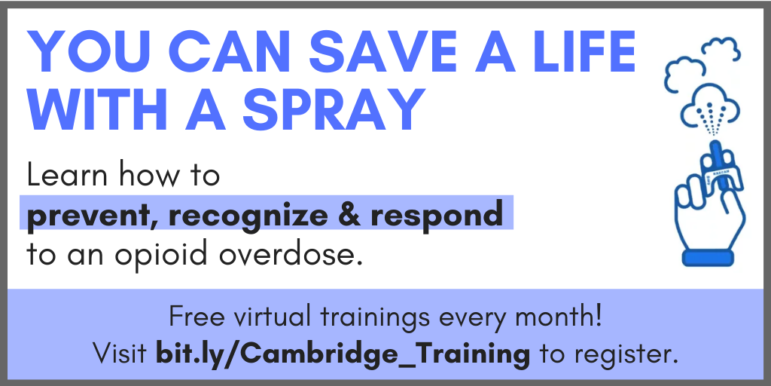
Wayside Youth & Family Network shared the announcement that free training on how to use the anti-overdose medication Nalaxone will be offered in August.
The training on how to use the Nalaxone (also known by the commercial name Narcan) nasal spray will be offered online, an is being run by the Cambridge Public Health Department.
Read the event announcement below:
Are you worried about overdoses happening where you work or live? Wondering how you can help prevent an overdose? Come and learn skills that could save lives. The Cambridge Public Health Department offers free overdose prevention and response trainings on a monthly basis to the community and free on-site trainings for groups by appointment.
This comprehensive 1.5-hour training includes:
- Up-to-date information about the opioid crisis in Cambridge.
- How to distinguish between overdose and non-emergency situations, such as drunkenness.
- What to do if you see someone in trouble.
- How to access naloxone (Narcan™), the overdose reversal medication.
To learn more, please contact Tali Schiller at the Cambridge Public Health Department at naschiller@challiance.org.
Click here to see a schedule of the trainings, and to register.

I went to a Narcan training last winter and I HIGHLY recommend attending one if you can. It is surprisingly straightforward to revive someone who has overdosed, and I was able to get Narcan for free from CVS because my insurance paid for it. Yours probably does as well. I hope to never have to use it, but if I do, I have it and know how to administer it safely.
The training I went to was run by the WPD and WFD. The WPD was represented by Lt. Dan Unsworth and the Jail Diversion Program (JDP) Clinician, Melissa Duarte. In addition to the Narcan training, the WPD and WFD members gave us background about the opioid epidemic and talked about the shift in attitudes towards addiction, from previously viewing it as a criminal issue to now seeing it as a health issue. This shift has saved lives, and we should be justifiably proud that our police department has had the courage to examine the way things have always been done and transform their policies to genuinely serve the needs of our town.
That Watertown has a clinician on staff to help people struggling with addiction get the resources they need shows a commitment to actual public safety that is admirable. It was discussed at the training how much less pressure individuals and their families feel when the person offering them guidance is a civilian and not an officer of the law. We need this sort of creative thinking as we continue to evaluate which issues are best handled by police, and which are best handled by specially trained civilian employees.
We also learned that the WFD responds to many more overdose calls than the WPD does, and that the WPD has learned a lot from the members of the WFD. I’m grateful that the departments have open lines of communication and share the goal of reducing the impact of the opioid epidemic on our community.